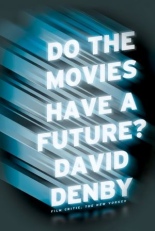
 Asks venerated critic David Denby in the ’78 Superman-styled title of his new book, Do the Movies Have a Future? (Spoiler alert: Yes. Yes, they certainly do.)
Asks venerated critic David Denby in the ’78 Superman-styled title of his new book, Do the Movies Have a Future? (Spoiler alert: Yes. Yes, they certainly do.)
Don’t be misled by the title, as this is not a near-400-page examination of the arguably rhetorical question. He deals with cinema’s place — and the criticism of cinema — in the Internet age only in his introduction and first few chapters, which then give way to an unthemed collection of essays and reviews, most previously published in the pages of The New Yorker. Whether you’re new to Denby or not, it’s a pleasurable, first-rate read of film criticism.
Among the features and profiles on stars, directors and genres, he delivers the single-best summations of “mumblecore” and “chick flicks” I’ve ever read. He’s sharp in both brain and barbs, able to break apart a genre with wit without being entirely dismissive — for example, “In romantic comedies as well as in chick flicks, Hollywood has been throwing women against the wall of Matthew McConaughey’s stupidity to see what sticks (the answer: Kate Hudson).”
In another piece, he gives director Victor Fleming his due and wonders, as I have, how the man responsible for helming two bona fide classics in The Wizard of Oz and Gone with the Wind — both from the same year, mind you — isn’t often top-of-mind among discussions of finest filmmakers. He even examines two film critics, notably Pauline Kael, which backs up the entirety of Brian Kellow’s recommended bio, Pauline Kael: A Life in the Dark: namely, that friendship with her was often one-sided and doomed to be temporary, and that she could be quite the rhymes-with-stunt.
Now, Denby is not the type of film critic who second-guesses his use of a word like “exegesis.” If you don’t know what it means and don’t bother to look it up, that’s your loss. The man definitely has his own language, which I’d argue is part of why he’s been able to carve a career out of talking about the language of movies themselves. Phrases like “a bounder” and “learned boobies” abound — and with the latter, he’s not talking about the breasts of a hot teacher.
Speaking of the body, I was amused at how often Denby describes his subjects in physical terms, and in the inimitable way he does it. For example, he notes Julia Roberts “for her big easy carriage” and “with her loose, shambling, cowhand’s walk”; Seth Rogen, meanwhile, sports “the round face and sottish grin of a Jewish Bacchus.” Whereas some may find these observations off-putting, I chalk them up to part of the book’s overall wide appeal.
Show me one online-only, fanboy “critic” who can turn such a phrase. You can’t; it’s as futile as viewing a film on a iPod screen — the subject of an early chapter. Do the Movies Have a Future? is a strong antidote to the ill-informed, online fanboy poison that sadly passes for film criticism these days. —Rod Lott
